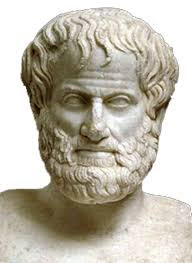Aristotle's theory of imitation (Poetics - Critical Theory)
Aristotle's Theory of Imitation
Introduction : Aristotle :-
| Aristotle | ||
|---|---|---|
| profile |
|
|
| Born | 384 BC, Greece | |
| Died | 382 BC, Greece | |
| Profession | Philosopher, First scientist | |
| Founded | Lyceum | |
| Nationality | Greek | |
| Education | Platonic Academy | |
| Influences | Socrates, Plato, Pythagoras, Epicurus etc. | |
| Students | Alexander, Theophrastus | |
| Influenced | Kant, Descartes, Aquinas, Rousseau etc. | |
| Works | Nicomachean ethics, poetics, politics, metaphysics | |
Aristotle's Theory of Imitation:-
It was Plato who invented the term 'Imitation'. Plato was of the view that a work of art is not more than an 'imitation of imitation'. A carpenter can, argues Plato, make no more than an imitation of the reality and the bed he makes is once removed from the truth. But the painter's bed is, argues Plato, twice removed from truth. Thus, drama is an imitation of imitation. Likewise poet too creates only a 'copy of copy'.
Aristotle understands the Plato's theory of imitation and gives his own arguments in order to disprove it. Aristotle held that poetry, or for that matter any fine art, is not an imitation of imitation but the imitation of reality. According to him, imitation is an objective representation of the life in literature. It is a creative and imaginative reconstruction of life.
Like Plato, Aristotle takes the example of a table and tells us that the idea of a table is reality. The poet, when he writes the poem about the table, doesn't see the table but with the help of his creative imagination he tries to reach the idea of table as near as possible. After he fully understood the idea, he tries to give it his own colour of imagination. He shapes the idea in a new manner. Thus with the help of his imagination he creates something new out of that idea.
| Important Links | |
|---|---|
| Critical Theory | Aristotle's Theory of Tragedy |
| American Literature | Emerson: Self Reliance |
| British Literature | Shakespeare : The Tempest |
| Linguistics | Phonetics & Phonology |
According to Aristotle, Imitation is a fundamental instinct, one can't even think of life without imitation. A child grows into a man by imitation. Thus imitation is indispensable for life. Likewise, imitation is indispensable for fine arts. In the viewpoints of Aristotle no fine art is possible without imitation. Plato was of the opinion that pleasure lies in reality and not in imitation. Aristotle has contrasting views on that. In his opinion, pleasure lies in imitation and not in reality. Tragedy in house gives grief but a tragic play is liked and appreciate by everyone.
Epic poetry, tragedy, comedy and dithyrambic poetry, as also the music of the flute and the lyre in most of their forms, in their general conception are modes of imagination. They differ, however, from one another in three respects- their medium, the object and the manner or mode of imitation, being in each case distinct. The medium of a painter and a poet differ from one another. One imitates through form and colour and the other through the means of language. Further, the manner of a poet may be purely narrative, as in the epic, or it may be a depiction through actions, as in drama. As per Aristotle, the objects of poetic imitation are 'men in action'. The poet can depict man as worse than he is. He may represent him better than as he is in real life. History tells what actually happened, poetry tells what may happen.
Poetry, thus, imitates the ideal and universal. It is the idealized representation of characters, emotions, action under different forms of manifestation. Poetic truth, hence/therefore, is higher than the historical truth.
Thus, Aristotle's theory of imitation is a remarkable landmark in the history of literary criticism. It has been accepted all over the world. By declaring poetic Imitation a creative process, Aristotle has imparted to the poetry a very high status in the realm of art and literature.
More in the Critical Theory :-
- Rasa Theory of Natyashastra.
- Contribution of Bharat Muni in art.
- Aristotle's theory of Catharsis.
- Aristotle's theory of tragedy.
- Elements of the Tragedy.
- Aristotle's conception of a tragic hero. (To be uploaded soon)
- Discuss principle sources of sublimity.

.jpeg)

.jpeg)
.jpeg)

.jpeg)




Comments
Post a Comment
Your Views and Comments means a lot to us.